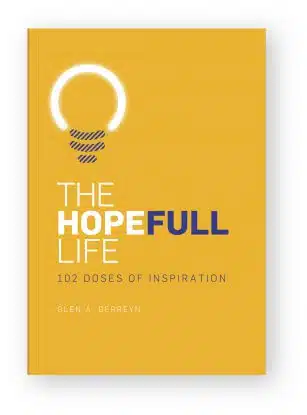Want to achieve your goals? Get uncomfortable. Here’s why you need to embrace life outside your comfort zone.
If you want to reach your full potential in 2024, aim to become a creature of discomfort and embrace things that are unpleasant or awkward.
Have you noticed how the world has become obsessed with cold plunges?
Everywhere you turn, people are throwing themselves into an uncomfortable position to embrace growth. It’s like the world has rebelled and suddenly become cognizant of the fact comfort is not advantageous to wellbeing or growth. Neither is living in a frictionless society.
The allure of a frictionless civilisation is undeniable. Think about AI powered learning, our perfectly filtered social media world, smooth commutes, seamless transactions and instant gratification at every turn. This utopian vision promises comfort and ease, but beneath its seductive surface lurks a hidden danger: the erosion of resilience and the stunting of true growth.
When life becomes an obstacle-free playground, we miss out on the crucial lessons that discomfort offers. Discomfort is not simply an annoyance; it’s a catalyst for change; a nudge that pushes us beyond our comfort zone and compels us to adapt, improvise and overcome.
Imagine a child who never stumbles on the playground and is perpetually cocooned in bubble wrap. While they might avoid scrapes and bruises, they’ll also miss out on developing the balance and agility that comes from learning to navigate uneven terrain. Similarly, in a frictionless society, we risk never developing the emotional and mental muscles needed to navigate life’s inevitable challenges. Without the friction of setbacks and disappointments, we lack the opportunity to build grit, resilience, and an appreciation for hard-won successes.
Are we addicted to comfort?
We wake up in temperature-controlled havens, scroll through endless entertainment, and consume media that confirms our biases rather than challenging them.
True growth demands more. It tells us to step outside our echo chambers, embrace the friction of disagreement, experience the sting of failure and the uncomfortable phase of learning something new.
This isn’t about becoming masochistic and seeking discomfort just for the sake of it. I’m not really talking about turning off the air conditioning in the hope it will make you grow as a person. It’s about recognising that discomfort is not the enemy, but the catalyst for change. Being uncomfortable is what forges resilience. It is the storm that sculpts character, the push that propels us beyond our perceived limitations.
The reality is that if you want to be a successful human being, not just a functional one, you must learn to do things you don’t want to.
Below are five ways to increase friction and push yourself to the edges of internal evolution.
1. Don’t get offended
Do you want to be the hero of your story or the victim? Too many people in today’s world embrace a victim mentality and are totally unaware of their true potential. When you identify as a victim, you lose all your power. I am not dismissing the fact that people are victims, but to identify as a victim is a recipe for hopelessness.
The opposite of hope is despair. Despair is an extreme form of disempowerment. Don’t close the book when bad things happen in your life. Just turn the page and begin a new chapter.
Living in our modern world requires the ability to ignore certain things. We need to focus on what we can control. We can’t live in a state of outrage.
Hot heads never have cool ideas!
Social media seems to love cultivating a sense of injustice. Our emotions are being hijacked and this is sabotaging our creativity, sense of purpose and ability to love.
Do you want to spend your life being offended or do you want to live with peace and love? We all need to have fewer opinions so we can have more friends.
The reason why some people can’t see the good in the world is because they can’t see the good inside of them.
But here’s a radical idea: maybe, just maybe, recognising the good within us is the key to seeing it out there. Think about it:
- When we acknowledge our own kindness, resilience, or creativity, it becomes easier to spot those qualities in others. Seeing your own strength reflected in the world around you amplifies the good and gives you the courage to believe in a brighter future.
- Appreciating our own imperfections – the stumbles, the growth, the messy humanity – opens us up to appreciating the same in others. We become more tolerant, more forgiving, and more likely to celebrate the unique journeys everyone takes.
- Nurturing our own inner light, however small, strengthens it enough to illuminate the world around us. We become sources of positive energy, inspiring others to tap into their own goodness and making the world a little brighter, one smile at a time.
During the 1960s, the popular saying was “If it feels good, do it”, but now the emphasis is on “Stop it if it feels bad”. Neither of these strategies are the keys to thriving in today’s modern world.
2. Embrace discomfort
“People take classes on self-help, mental toughness, breathing control – the only way to get tougher is to put yourself in hellacious situations.” – David Goggins
It is very difficult to grow to your full potential without enduring something hard. When you ask someone, “What made you who you are?” Nobody ever said, “Well I had a great vacation in the Maldives!” It’s usually, “I went through a really tough period of struggle, and I had to reorient myself.”
Life will throw you some curveballs. I once told this to a high school student. She said, “I haven’t really had that much suffering in my life. Where should I go to find suffering?” I said, “Don’t worry, the suffering will find you.”
Poisonous positivity denies reality. When people say, “You are okay being who you are,” that is not grounded in reality. You will face challenges in your future that you are currently not prepared for and don’t see coming. To live a sustainable life, you need to adapt and grow. The hard truth is you are not everything you could be, and you know it. You can’t keep denying reality.
“Without struggle, nobody will know what you are capable of, not even yourself.” – Seneca
3. Be open to feedback
“The purpose of getting feedback is not to shame my past self, but to educate my future self.” – Adam Grant
True growth, both personal and relational, thrives in the friction zone, where the discomfort of challenge and feedback polishes us into better versions of ourselves.
Think of a diamond born under immense pressure and friction. Its raw carbon transforms it into the dazzling gem we cherish. Similarly, relationships flourish when we embrace their inherent friction. Feedback, even if uncomfortable, becomes the polishing dust that reveals our blind spots and refines our interactions.
This is the paradox of friction: it disrupts, ignites discomfort, and yet, paradoxically, strengthens. Disagreements, when handled constructively, stretch our perspectives, and encourage critical thinking. Honest feedback, especially from those who care about us, can be the catalyst for personal evolution. We shed outdated behaviours, refine our communication skills, and become more compassionate partners, friends, and collaborators.
Of course, navigating friction requires emotional intelligence and empathy. Discernment is key. Seek feedback from those who offer it with genuine care and a desire for your growth. Learn to differentiate constructive criticism from negativity, and remember, your worth is not contingent on external validation.
Ultimately, embracing the friction in relationships is a conscious choice. It’s about choosing growth over comfort and connection over complacency. It’s about recognising that the sting of disagreement and the discomfort of feedback are not roadblocks, but stepping stones on a path to richer, more meaningful relationships and a more authentic self.
4. Embrace mental agility.
“Think more; Feel less.”- Dalai Lama
Emotions are powerful but if left unchecked, they can overwhelm you. Learning to manage them, as the Dali Lama suggests, lets you navigate discomfort effectively and emerge stronger.
You either manage your feelings or your feelings manage you. Emotions are powerful tools, so make sure you learn to use them for growth.
Get agile and reframe your thinking. Instead of saying “I hate myself so much right now,” let’s say it differently.
Try, “I hate how this is making me feel.” By reframing this statement, you move from powerless to powerful.
Do not let your words sap your strength and self-confidence. The pattern is the problem, not you. Negative self-talk can hinder progress. Let’s focus on identifying and addressing the problem rather than dwelling on the way it’s making you feel.
5. Be open
“The human mind can only see what it is prepared to see.” – Edward De Bono
When it comes to personal growth, being open is crucial. Edward De Bono’s quote encapsulates the essence of this idea. It highlights that our perceptions are limited by our mental readiness to accept new ideas and experiences. Those who are rigid in their thinking often prioritise comfort, certainty and security over growth. They struggle to embrace change and may find themselves restricted by their own perspectives. This inclination towards inflexibility can hinder their ability to evolve and adapt to new situations and challenges.
In today’s fast-paced world, many individuals exhibit obstinacy and stubbornness when presented with the idea of change. This rigidity often stems from a deep-seated fear of the unknown and an aversion to discomfort. People who cling tightly to their existing beliefs and routines may struggle to see beyond their familiar perspectives. Consequently, they miss out on valuable opportunities for self-discovery and learning. By remaining closed off to new ideas and experiences, they limit their potential for personal growth and development.
Contrary to this, an open-minded approach fosters growth and resilience in the face of discomfort. By embracing uncertainty and being receptive to new concepts, individuals can overcome the limitations of their current knowledge and beliefs. It’s the ability to entertain new ideas and perspectives that enables personal evolution and transformation.
Cultivating openness allows individuals to explore uncharted territory, challenge their preconceptions, and broaden their understanding of the world and themselves. In doing so, they become better equipped to navigate the complexities of life and harness the opportunities hidden within discomfort.
Being open will break you free from the constraints of rigid thinking, expand your horizons and unlock your ability to become the person you know you can be.
The salient idea here is to take charge. You have agency, not do just what feels good but to do what is required.
Ask yourself; what am I putting off because it feels uncomfortable? And remember that once you have tried something new and pushed through the tricky first stage, the unfamiliar will become comfortable and you’ll have taken the next step to your best self.

